人教版九年级全一册英语Unit 12词汇及句型用法总结-
人教版九年级英语unit12知识点归纳
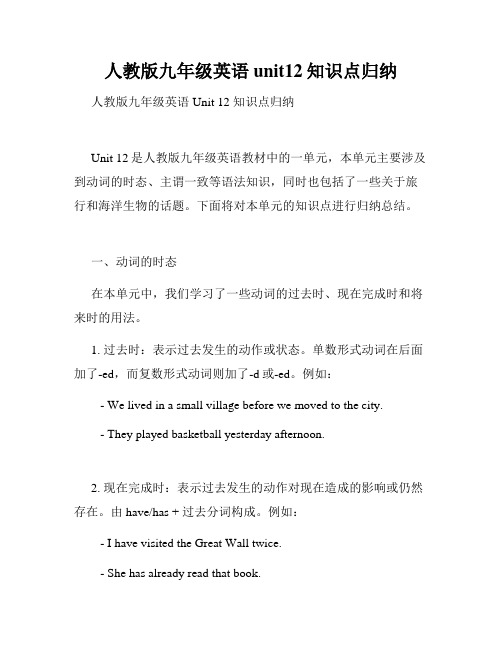
人教版九年级英语unit12知识点归纳人教版九年级英语Unit 12 知识点归纳Unit 12是人教版九年级英语教材中的一单元,本单元主要涉及到动词的时态、主谓一致等语法知识,同时也包括了一些关于旅行和海洋生物的话题。
下面将对本单元的知识点进行归纳总结。
一、动词的时态在本单元中,我们学习了一些动词的过去时、现在完成时和将来时的用法。
1. 过去时:表示过去发生的动作或状态。
单数形式动词在后面加了-ed,而复数形式动词则加了-d或-ed。
例如:- We lived in a small village before we moved to the city.- They played basketball yesterday afternoon.2. 现在完成时:表示过去发生的动作对现在造成的影响或仍然存在。
由have/has + 过去分词构成。
例如:- I have visited the Great Wall twice.- She has already read that book.3. 将来时:表示将来要发生的动作或存在的状态。
由will + 动词原形构成。
例如:- We will go to the beach tomorrow.- They will have a party next week.二、主谓一致主谓一致是指主语和谓语在人称和数上保持一致。
在本单元中,我们需要特别注意以下几点:1. 主语为第三人称单数时,谓语动词需要加-s或-es。
例如:- He often goes to the cinema on weekends.2. 表示时间、距离、金钱等的量词作主语时,谓语动词的单复数形式与它们代表的数量有关。
例如:- Ten yuan is enough to buy a drink.三、旅行话题在本单元中,我们学习了一些与旅行相关的词汇和句型,并通过对话的形式来进行实际应用。
英语九年级第12单元单词人教版
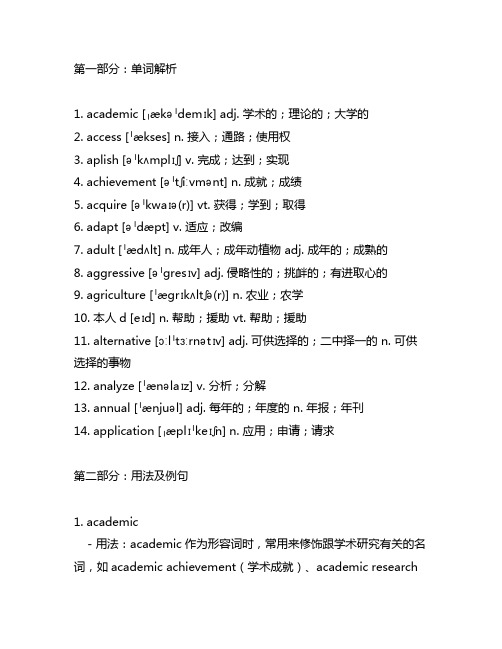
第一部分:单词解析1. academic [ˌækəˈdemɪk] adj. 学术的;理论的;大学的2. access [ˈækses] n. 接入;通路;使用权3. aplish [əˈkʌmplɪʃ] v. 完成;达到;实现4. achievement [əˈtʃiːvmənt] n. 成就;成绩5. acquire [əˈkwaɪə(r)] vt. 获得;学到;取得6. adapt [əˈdæpt] v. 适应;改编7. adult [ˈædʌlt] n. 成年人;成年动植物 adj. 成年的;成熟的8. aggressive [əˈɡresɪv] adj. 侵略性的;挑衅的;有进取心的9. agriculture [ˈæɡrɪkʌltʃə(r)] n. 农业;农学10. 本人d [eɪd] n. 帮助;援助 vt. 帮助;援助11. alternative [ɔːlˈtɜːrnətɪv] adj. 可供选择的;二中择一的 n. 可供选择的事物12. analyze [ˈænəlaɪz] v. 分析;分解13. annual [ˈænjuəl] adj. 每年的;年度的 n. 年报;年刊14. application [ˌæplɪˈkeɪʃn] n. 应用;申请;请求第二部分:用法及例句1. academic- 用法:academic作为形容词时,常用来修饰跟学术研究有关的名词,如academic achievement(学术成就)、academic research(学术研究)等。
- 例句:He has made significant academic achievements in the field of physics.(他在物理学领域取得了显著的学术成就。
)2. access- 用法:access作为名词时,常表示“接入”或“通路”的意思;作为动词时,表示“使用权”或“接近”的意思。
人教版九年级英语Unit12单元知识点梳理
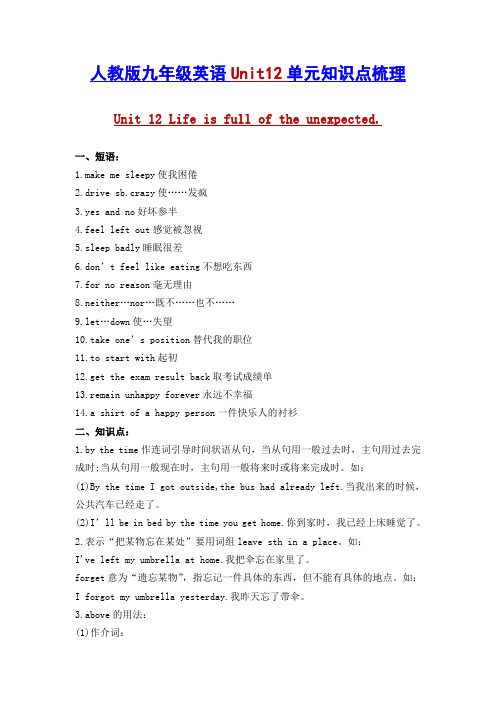
一、短语:1.make me sleepy使我困倦2.drive sb.crazy使……发疯3.yes and no好坏参半4.feel left out感觉被忽视5.sleep badly睡眠很差6.don’t feel like eating不想吃东西7.for no reason毫无理由8.neither…nor…既不……也不……9.let…down使…失望10.take one’s position替代我的职位11.to start with起初12.get the exam result back取考试成绩单13.remain unhappy forever永远不幸福14.a shirt of a happy person一件快乐人的衬衫二、知识点:1.by the time作连词引导时间状语从句,当从句用一般过去时,主句用过去完成时;当从句用一般现在时,主句用一般将来时或将来完成时。
如:(1)By the time I got outside,the bus had already left.当我出来的时候,公共汽车已经走了。
(2)I’ll be in bed by the time you get home.你到家时,我已经上床睡觉了。
2.表示“把某物忘在某处”要用词组leave sth in a place。
如:I've left my umbrella at home.我把伞忘在家里了。
forget意为“遗忘某物”,指忘记一件具体的东西,但不能有具体的地点。
如:I forgot my umbrella yesterday.我昨天忘了带伞。
3.above的用法:(1)作介词:在……上面,如:The moon is above the trees now.月亮现在正位于树梢上。
‚在…之上,超过,如:They are children above six years old.他们是六岁以上的孩子。
人教版初中英语9年级全一册Unit12知识清单+习题(含答案)doc资料

人教版初中英语9年级全一册Un i t12知识清单+习题(含答案)九年 Unit 12 Life is full of the unexpected 一、必背词汇unexpected adj.出乎意料的;始料不及的backpack n.背包;旅行包oversleep v.睡过头;睡得太久block n.街区worker n.工作者;工人stare v.叮着看;凝视disbelief n.不信;怀疑above prep.在…上面 adv在上面burn v.着火;燃烧burning adj.着火的;燃烧的alive adj.活着;有生气的airport n.机场till prep.&conj,到;直到west adv.向西;朝西adj.向西的;西部的n.西;西方cream n.奶油;乳脂workday n.工作日pie n.果馅饼;果馅派bean n.豆;豆荚market n.市场;集市fool n.蠢人;傻瓜v愚弄costume n,服装;装束embarrassed adj.窘迫的;害羞的announce v.宣布;宣告spaghetti n.意大利面条hoax n骗局;恶作剧discovery n.发现;发觉lady n.女士;女子cancel v.取消;终止officer n.军官;官员believable adj.可相信的;可信任的disappear v.消失;不见embarrassing adj.使人害羞的二、常考短语、用法by the time在…以前give…… a lift捎…一程in line with与…成一排show up赶到;露面by the end of在(某时间点)以前costume party化装舞会sell out卖光take a shower洗淋浴be late for.做……迟到go off(闹铃、警铃等)响起wake up醒来put on穿上rush out冲出;奔出brush one’s teeth刷牙end up最终成为,最后处于be full of充满;装满stare at 凝视……;盯着……看in disbelief怀疑地;难以置信地take off起飞turn into变成arrive at到达leave for动身去…get dressed穿衣服stay up熬夜on April Fool’s Day在愚人节那天all kinds of各种各样的play jokes on sb.开某人的玩笑no more不再get married结婚hundreds of数以百计的the whole country全国run away逃跑hear about 听说invite sb. to+某地邀请某人去某地leave+宾语+地点状语把…忘在某处start doing sth. 开始做某事be about to do sth.刚要/即将做某事decide to do sth.决定做某事forget to do sth.忘记做某事keep doing sth.继续做某事ask sb. to do sth.请求某人做某事marry sb.= get married to sb.和某人结婚as much+不可数名词+ as one can/ could尽可能多so+adi./adv+that.如此…以至于…(that引导结果状语从句)finish doing sth.完成某事get a chance to do sth.得到机会做某事三、重点句型1. By the time I got up, my brother had already gotten in the shower.我起床时,我的哥哥已经在洗淋浴了。
人教版九年级英语第十二单元知识点总结
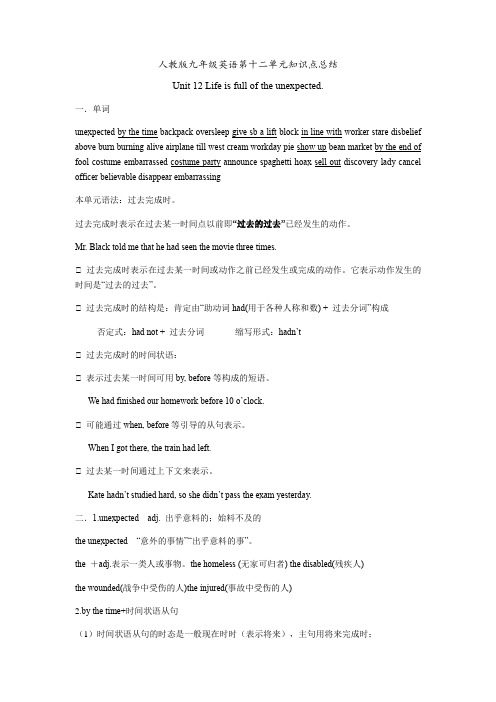
人教版九年级英语第十二单元知识点总结Unit 12 Life is full of the unexpected.一.单词unexpected by the time backpack oversleep give sb a lift block in line with worker stare disbelief above burn burning alive airplane till west cream workday pie show up bean market by the end of fool costume embarrassed costume party announce spaghetti hoax sell out discovery lady cancel officer believable disappear embarrassing本单元语法:过去完成时。
过去完成时表示在过去某一时间点以前即“过去的过去”已经发生的动作。
Mr. Black told me that he had seen the movie three times.⑴ 过去完成时表示在过去某一时间或动作之前已经发生或完成的动作。
它表示动作发生的时间是“过去的过去”。
⑴ 过去完成时的结构是:肯定由“助动词had(用于各种人称和数) + 过去分词”构成否定式:had not + 过去分词缩写形式:hadn’t⑴ 过去完成时的时间状语:⑴ 表示过去某一时间可用by, before等构成的短语。
We had finished our homework before 10 o’clock.⑴ 可能通过when, before等引导的从句表示。
When I got there, the train had left.⑴ 过去某一时间通过上下文来表示。
Kate hadn’t studied hard, so she didn’t pass the exam yesterday.二.1.unexpected adj. 出乎意料的;始料不及的the unexpected “意外的事情”“出乎意料的事”。
人教版九年级英语全一册十二单元语法与短语总结
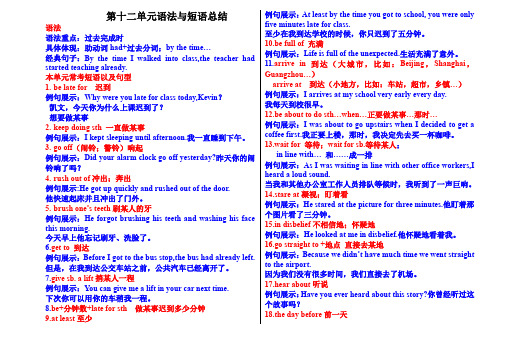
第十二单元语法与短语总结语法语法重点:过去完成时具体体现:助动词had+过去分词;by the time…经典句子:By the time I walked into class,the teacher had started teaching already.本单元常考短语以及句型1.be late for 迟到例句展示:Why were you late for class today,Kevin?凯文,今天你为什么上课迟到了?想要做某事2.keep doing sth 一直做某事例句展示:I kept sleeping until afternoon.我一直睡到下午。
3.go off(闹铃;警铃)响起例句展示:Did your alarm clock go off yesterday?昨天你的闹铃响了吗?4.rush out of冲出;奔出例句展示:He got up quickly and rushed out of the door.他快速起床并且冲出了门外。
5.brush one’s teeth刷某人的牙例句展示:He forgot brushing his teeth and washing his face this morning.今天早上他忘记刷牙、洗脸了。
6.get to 到达例句展示:Before I got to the bus stop,the bus had already left. 但是,在我到达公交车站之前,公共汽车已经离开了。
7.give sb. a lift捎某人一程例句展示:You can give me a lift in your car next time.下次你可以用你的车稍我一程。
8.be+分钟数+late for sth 做某事迟到多少分钟9.at least至少例句展示:At least by the time you got to school, you were only five minutes late for class.至少在我到达学校的时候,你只迟到了五分钟。
人教九年级Unit 12 单词+短语+句子(含答案)

Unit 12 单词、短语、句子自测一、单词1. _____________背包;旅行包2.___________睡过头3._____________捎(某人)一程4._____________错过;未得到5.____________出乎意料的;始料不及的6.___________街区7._____________工作者;工人 8._____________盯着看;凝视9.____________不信;怀疑10.________在上面;向上面prep在上面 11._________着火;燃烧12._______活着;有生气的13.___________(飞机等)起飞;匆忙离开14.___________到;直到 15.___________向西;朝西16.____________奶油;乳脂 17.___________老板;领导 18.____________果馅饼;果馅派19._____________课程 20.____________豆;豆荚 21._____________市场;集市22._____________服装;装束 23.___________ _窘迫的;害羞的 24._____________宣布;宣告25._____________意大利面条26._____________骗局;恶作剧 27._____________发现;发觉28.___________女士;女子 29.___________军官;官员 30.____________可相信的;可信任的31._____________使人害羞的 32._________新西兰 33._________意大利 34._______火星二、短语1. ____________________________洗浴2. ________________________把背包忘在家里3. _________________________返回学校4.______________________________开始教学5. __________________________响铃6. _____________________________ 冲出房门7. _______________________ 捎某人一程 8. _________________________ 错过两个事件9. ______________________充满着不可预知性 10. ______________________正要做某事11. ___________________难以置信地盯着 12. ________________ 从正在燃烧的楼上升起13. __________________________跳下床 14. ___________________________收数学作业15. _____________________完成老板的工作 16. ______________________ 制作苹果馅饼17. ____________________赶到,出现 18. _____________________________加绿豆荚三、重点句型1.当我起床时,我哥哥已经进了浴室了。
人教版九年级全一册英语 Unit 12 重点语法知识点复习提纲
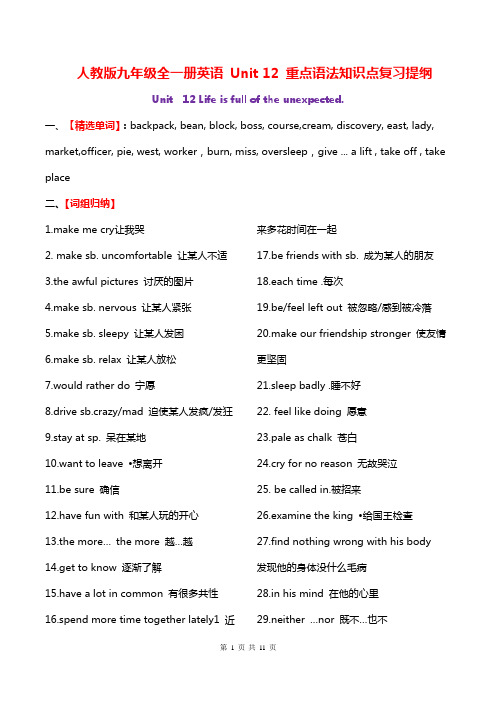
人教版九年级全一册英语Unit 12 重点语法知识点复习提纲Unit 12 Life is full of the unexpected.一、【精选单词】:backpack, bean, block, boss, course,cream, discovery, east, lady, market,officer, pie, west, worker,burn, miss, oversleep,give ... a lift , take off , take place二、【词组归纳】1.make me cry让我哭2. make sb. uncomfortable 让某人不适3.the awful pictures 讨厌的图片4.make sb. nervous 让某人紧张5.make sb. sleepy 让某人发困6.make sb. relax 让某人放松7.would rather do 宁愿8.drive sb.crazy/mad 迫使某人发疯/发狂9.stay at sp. 呆在某地10.want to leave •想离开11.be sure 确信12.have fun with 和某人玩的开心13.the more…the more 越…越14.get to know 逐渐了解15.have a lot in common 有很多共性16.spend more time together lately1 近来多花时间在一起17.be friends with sb. 成为某人的朋友18.each time .每次19.be/feel left out 被忽略/感到被冷落20.make our friendship stronger 使友情更坚固21.sleep badly .睡不好22. feel like doing 愿意23.pale as chalk 苍白24.cry for no reason 无故哭泣25. be called in.被招来26.examine the king •给国王检查27.find nothing wrong with his body 发现他的身体没什么毛病28.in his mind 在他的心里29.neither …nor 既不…也不30.the prime minister 首相31.explain the situation to sb. 向某人解释情况32.have a lot of power 有很大权力33.be worried about /worry about 担心34.lose my power 失去权力35.take one’s position/place 代替某人36.have a lot of wealth 有大量财富37.it’s true that ….是真的38.be followed by 被追随39.top general 大将军40. in three days’time •••三天时间后41.to start with 起初,开始时42.throw rubbish 扔垃圾43.clean up the streets 打扫大街44.get...back 取回,要回45.hand back 发下46. answer well 答的好47.remain unhappy 依然不开心48.a person with power and money 一个有钱有势的人49.search for 搜寻50.even though 即使51.a heavy weight on his shoulders 重担压在肩上52.walk home alone 独自走回家53.the worst day of his life 一生中最糟糕的一天54.stop doing/to do 停止正在做/去干55.think about 考虑56.on the soccer field 在足球场57.miss doing 错过做...58.let sb. down •12.使...失望59.kick sb. off ••开除某人•60.as soon as 一...就61.walk through the door 走过门62.without another word 没有再说一句话63.hear sb. doing 听到某人正在做64.knock on the door 敲门65.let sb. in .让某人进入66.be too hard on sb. 对某人苛刻/严厉67.team effort 团队努力68.the only reason 唯一理由69.support each other.相互支持municate with 同...沟通/交流71. learn from 向...学习72.do sth. with courage ••••有勇气做某事73.rather than 而不是74.fear in his heart 心中的恐惧75.be close to 靠近,接近76.pull together 齐心协力77.to his surprise and relief 令他吃惊和欣慰的78.nod in agreement 点头同意79.not one person's fault 不是一个人的错80.feel lucky to do 感觉幸运地做...81. be on a winning team .在一个会赢的队伍中82.miss a goal .失球83.offer sb. sth.=offer sth. to sb. .给某人提供某物84.be asked to leave 被请求离开85.put so much pressure on sb. ••给某人施加如此多的压力86.work hard together .团结协作,齐心协力87.win /lose a competition 赢/失去比赛88.perform sth. well/badly 表演什么好/坏89.in front of a big group of people 在一大群人面前90.get into a fight with sb. 与某人打架/争吵91. follow me around …到处跟着我 ...三、【重点句式】;1.Life is full of the unexpected. 生活充满了意料之外的事。
人教版九年级全一册英语Unit12单元语法知识点总结
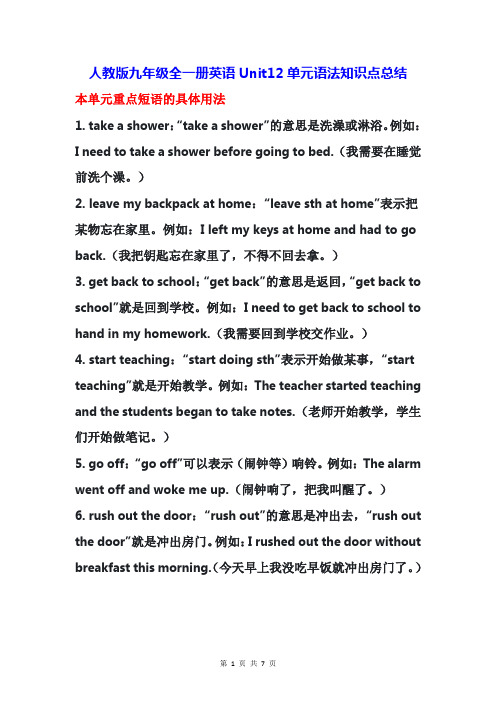
人教版九年级全一册英语Unit12单元语法知识点总结本单元重点短语的具体用法1. take a shower:“take a shower”的意思是洗澡或淋浴。
例如:I need to take a shower before going to bed.(我需要在睡觉前洗个澡。
)2. leave my backpack at home:“leave sth at home”表示把某物忘在家里。
例如:I left my keys at home and had to go back.(我把钥匙忘在家里了,不得不回去拿。
)3. get back to school:“get back”的意思是返回,“get back to school”就是回到学校。
例如:I need to get back to school to hand in my homework.(我需要回到学校交作业。
)4. start teaching:“start doing sth”表示开始做某事,“start teaching”就是开始教学。
例如:The teacher started teaching and the students began to take notes.(老师开始教学,学生们开始做笔记。
)5. go off:“go off”可以表示(闹钟等)响铃。
例如:The alarm went off and woke me up.(闹钟响了,把我叫醒了。
)6. rush out the door:“rush out”的意思是冲出去,“rush out the door”就是冲出房门。
例如:I rushed out the door without breakfast this morning.(今天早上我没吃早饭就冲出房门了。
)7. give sb a lift:“give sb a lift”的意思是让某人搭车、捎某人一程。
人教版英语九年级全册Unit12知识点归纳讲解和写作指导

Unit12 知识点归纳讲解和写作指导重点知识归纳Section Atake a shower洗淋浴by the time ...在... 以前alarm clock 闹钟go off (闹钟)发出响声keep doing sth. 一直做某事wake up 醒来put on some clothes穿上衣服rush out of the door 冲出门夕卜give ... a lift 捎... 一程at least 至少be five minutes late for class上课迟至U 5 分钟be full of ...充满...arrive at 至达be about to do sth.正要做某事eve n though即使;尽管wait in line with ... 与.... 一起排队等待go on 继续;发生stare at sb. / sth盯着某人/某物in disbelief 不信;怀疑地jump out of bed 从床上跳下来go straight to the airport 直奔机场miss my pla ne 误了航班think to oneself 心中想;盘算wait till the next day 等至第二天hear about 听说the day before 前一天turn into 变成show up 露面;赶到by the end of在(某时间点)以前Section Bget dressed穿上衣服costume party化装舞会stay up all night 整晚熬夜April Fool ' san in troduct ion to ...对.. 的介绍take place 发生local supermarkets当地的超市sell out 卖光lose weight 减肥find out 弄清;查明end up doi ng sth .以做某事告终get married 结婚cancel his show取消他的节目hun dreds of成百上千的;数以百计的thousa nds of成千上万的;数以千计的police officers 警官rush to ...匆忙去...more tha n超过;多于run away from 逃离on the first day of school 在上学第一天turn around 转向;回转hand in 上交重点知识点讲解1. alive 作形容词,意为“活着;有生气的”,在句中可作表语、后置定语或宾语补足语。
人教版九年级英语Unit12单词、课文知识梳理,词汇句式精讲
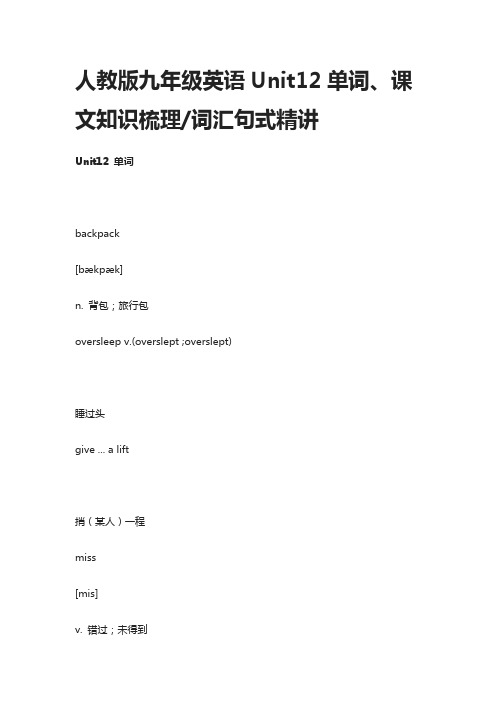
人教版九年级英语Unit12单词、课文知识梳理/词汇句式精讲Unit12 单词backpack[bækpæk]n. 背包;旅行包oversleep v.(overslept ;overslept)睡过头give ... a lift捎(某人)一程miss[mis]v. 错过;未得到unexpected[ʌnikspektid]a.出乎意料的;始料不及的block[blɔk ]n. 街区worker[wə:(r)kə(r)]n. 工作者;工人stare[steə]v. 盯着看;凝视disbelief[disbili:f]n. 不信;怀疑above[ əbʌv]adv. 在上面;向上面pre在上面burn[bə:(r)n]v. (burnt; burned ) 着火;燃烧alive[ əlaIv]adj. 活着;有生气的take off(飞机等)起飞;匆忙离开till[til]conj. & pre到;直到west[west]adv. 向西;朝西adj. 向西的;西部的n. 西;西方cream[kri:m]n. 奶油;乳脂boss[bɔs]n. 老板;领导pie[pai]n. 果馅饼;果馅派course[kɔ:(r)s]n. 课程bean[bi:n]n. 豆;豆荚[ma:(r)kit]n. 市场;集市costume[kɔstju:m]n.服装;装束embarrassed [imbærəst] adj.窘迫的;害羞的announce[ ənauns]v. 宣布;宣告spaghetti[spəgeti]n. 意大利面条hoaxn. 骗局;恶作剧discovery[diskʌvəri]n. 发现;发觉lady[leidi]n. 女士;女子officer[ ɔfisə]n.军官;官员believable[bili:vəbl]adj.可相信的;可信任的embarrassing[imbærəsiŋ]a. 使人害羞的(难堪的或惭愧的)New Zealand[nju:zi:lənd]新西兰Italy[Itəli]意大利Mars[ma:(r)z]火星Carl[ka:(r)l]卡尔(男名)OrsonWelles[ɔ:(r)sən; welz]奥森•韦尔斯Unit12 知识梳理【重点短语】1. take a shower洗浴2. leave my backpack at home 把背包忘在家里3. get back to school 返回学校4. start teaching 开始教学5. go off 响铃6. rush out the door 冲出房门7. give sb a lift 捎某人一程8. miss both events 错过两个事件9. full of unexpected 充满着不可预知性10. be about to do sth 正要做某事11. stare in disbelief at 难以置信地盯着。
人教版九年级英语Unit12单词、课文知识梳理,词汇句式精讲

人教版九年级英语Unit12单词、课文知识梳理/词汇句式精讲Unit12 单词backpack[bækpæk]n. 背包;旅行包oversleep v.(overslept ;overslept)睡过头give ... a lift捎(某人)一程miss[mis]v. 错过;未得到unexpected[ʌnikspektid]a.出乎意料的;始料不及的block[blɔk ]n. 街区worker[wə:(r)kə(r)]n. 工作者;工人stare[steə]v. 盯着看;凝视disbelief[disbili:f]n. 不信;怀疑above[ əbʌv]adv. 在上面;向上面pre在上面burn[bə:(r)n]v. (burnt; burned ) 着火;燃烧alive[ əlaIv]adj. 活着;有生气的take off(飞机等)起飞;匆忙离开till[til]conj. & pre到;直到west[west]adv. 向西;朝西adj. 向西的;西部的n. 西;西方cream[kri:m]n. 奶油;乳脂boss[bɔs]n. 老板;领导pie[pai]n. 果馅饼;果馅派course[kɔ:(r)s]n. 课程bean[bi:n]n. 豆;豆荚[ma:(r)kit]n. 市场;集市costume[kɔstju:m]n.服装;装束embarrassed [imbærəst] adj.窘迫的;害羞的announce[ ənauns]v. 宣布;宣告spaghetti[spəgeti]n. 意大利面条hoaxn. 骗局;恶作剧discovery[diskʌvəri]n. 发现;发觉lady[leidi]n. 女士;女子officer[ ɔfisə]n.军官;官员believable[bili:vəbl]adj.可相信的;可信任的embarrassing[imbærəsiŋ]a. 使人害羞的(难堪的或惭愧的)New Zealand[nju:zi:lənd]新西兰Italy[Itəli]意大利Mars[ma:(r)z]火星Carl[ka:(r)l]卡尔(男名)OrsonWelles[ɔ:(r)sən; welz]奥森•韦尔斯Unit12 知识梳理【重点短语】1. take a shower洗浴2. leave my backpack at home 把背包忘在家里3. get back to school 返回学校4. start teaching 开始教学5. go off 响铃6. rush out the door 冲出房门7. give sb a lift 捎某人一程8. miss both events 错过两个事件9. full of unexpected 充满着不可预知性10. be about to do sth 正要做某事11. stare in disbelief at 难以置信地盯着。
人教版九年级unit12知识点

人教版九年级unit12知识点人教版九年级Unit 12知识点Unit 12: Can you be my Chinese pen friend?本单元主要围绕学生是否能够成为彼此的笔友展开,涉及到信件写作、文化交流等方面的知识。
以下是本单元的重点内容。
一、词汇与短语1. pen friend:笔友2. introduce:介绍3. communicate:交流4. foreign:外国的5. country:国家6. habit:习惯7. similar:相似的8. different:不同的9. respect:尊重10. traditional:传统的二、语法与句型1. 一般现在时:常用于描述现在情况或日常习惯,如:I live in China.(我住在中国。
)2. there be句型:用于描述某地有某物或某人。
如:There is a park near my house.(在我家附近有个公园。
)3. 直接引语与间接引语:直接引语是直接引述他人的话语,用引号标注;间接引语是对他人说话的间接转述,不使用引号。
如:He said, "I love playing soccer."(他说:“我喜欢踢足球。
”)→He said that he loved playing soccer.(他说他喜欢踢足球。
)三、重点句子1. Can you introduce yourself?(你能介绍一下自己吗?) - Yes, of course. My name is Tom. I'm from the United States.(是的,当然可以。
我的名字叫汤姆。
我来自美国。
)2. What's your daily routine? (你的日常作息是怎样的?)- I usually get up at 7 o'clock in the morning and have breakfast at 7:30.(我通常早上7点起床,7点半吃早饭。
Unit12重点知识人教版九年级英语全册
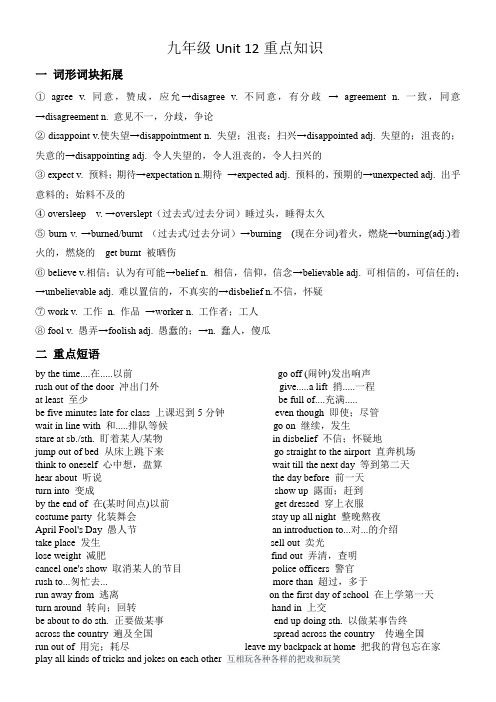
九年级Unit 12重点知识一词形词块拓展①agree v. 同意,赞成,应允→disagree v. 不同意,有分歧→ agreement n. 一致,同意→disagreement n. 意见不一,分歧,争论② disappoint v.使失望→disappointment n. 失望;沮丧;扫兴→disappointed adj. 失望的;沮丧的;失意的→disappointing adj. 令人失望的,令人沮丧的,令人扫兴的③ expect v. 预料;期待→expectation n.期待→expected adj. 预料的,预期的→unexpected adj. 出乎意料的;始料不及的④ oversleep v. →overslept(过去式/过去分词)睡过头,睡得太久⑤ burn v. →burned/burnt (过去式/过去分词)→burning (现在分词)着火,燃烧→burning(adj.)着火的,燃烧的get burnt 被晒伤⑥ believe v.相信;认为有可能→belief n. 相信,信仰,信念→believable adj. 可相信的,可信任的;→unbelievable adj. 难以置信的,不真实的→disbelief n.不信,怀疑⑦ work v. 工作n. 作品→worker n. 工作者;工人⑧ fool v. 愚弄→foolish adj. 愚蠢的;→n. 蠢人,傻瓜二重点短语by the time....在.....以前go off (闹钟)发出响声rush out of the door 冲出门外give.....a lift 捎.....一程at least 至少be full of....充满.....be five minutes late for class 上课迟到5分钟even though 即使;尽管wait in line with 和.....排队等候go on 继续,发生stare at sb./sth. 盯着某人/某物in disbelief 不信;怀疑地jump out of bed 从床上跳下来go straight to the airport 直奔机场think to oneself 心中想,盘算wait till the next day 等到第二天hear about 听说the day before 前一天turn into 变成show up 露面;赶到by the end of 在(某时间点)以前get dressed 穿上衣服costume party 化装舞会stay up all night 整晚熬夜April Fool's Day 愚人节an introduction to...对...的介绍take place 发生sell out 卖光lose weight 减肥find out 弄清,查明cancel one's show 取消某人的节目police officers 警官rush to...匆忙去... more than 超过,多于run away from 逃离on the first day of school 在上学第一天turn around 转向;回转hand in 上交be about to do sth. 正要做某事end up doing sth. 以做某事告终across the country 遍及全国spread across the country 传遍全国run out of 用完;耗尽leave my backpack at home 把我的背包忘在家play all kinds of tricks and jokes on each other 互相玩各种各样的把戏和玩笑三.Grammar过去完成时1.When I got to school, I realized I had left my backpack at home.2.By the time I got back to school, the bell had rung.3.But before I got to the bus stop, the bus had already left.Summary:1)意义:过去完成时表示过去某个时间或某个动作____发生的动作,它表示动作发生的时间是“________________”,它是一种相对于___________的时态,没有_________________就没有过去完成时态。
人教版九年级全册英语第12单元知识点复习提纲

人教版九年级全册英语第12单元知识点复习提纲1.原文再现:At the end of the day, we watched fireworks.讲解:(1) in the end意为“最后,最终;终于”,相当于finally,at last;常用来表明事情的结局,一般在句中单独使用。
例如:I believe everything will be great in the end. 我相信最终一切都会好起来的。
(2) at the end of其后可跟表示时间和地点的名词,意为“在……末端/尽头”。
例如:We will have an exam at the end of July. 7月底我们要参加一场考试。
The shop is at the end of the street. 这家商店位于这条路的尽头。
(3) by the end of意为“到……末”,其后跟不同的时间,就会有不同的含义和用法:①若后面跟将来的时间,一般使用将来时态,例如:By the end of the next year, I will finish writing this book. 到明年年底,我将写完这本书。
②若后面跟表示现在的时间,则使用现在完成时,例如:By the end of this week, I have written two books. 到这个星期末,我已经写了两本书了。
③若后面跟过去的时间,则使用过去完成时,例如:By the end of last month, the students had learned 300 words. 到上个月末,学生们已经学了300个单词了。
2.课文原句:By the time I arrived at the party, everyone had already shown up.By the time people found out the story was not true, all the spaghetti in the supermarkets had disappeared.show up = appear 露面;显现;出现We thought that you were never going to show up.我们以为你打算永远不露面。
人教版九年级英语全一册:Unit 12语法知识点复习提纲(全面,必备!)
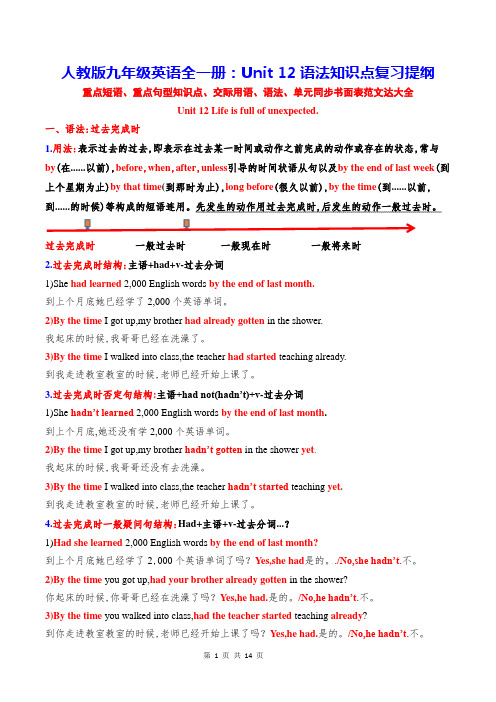
人教版九年级英语全一册:Unit 12语法知识点复习提纲重点短语、重点句型知识点、交际用语、语法、单元同步书面表范文达大全Unit 12 Life is full of unexpected.一、语法:过去完成时1.用法:表示过去的过去,即表示在过去某一时间或动作之前完成的动作或存在的状态,常与by(在......以前),before,when,after,unless引导的时间状语从句以及by the end of last week(到上个星期为止)by that time(到那时为止),long before(很久以前),by the time(到......以前,到......的时候)等构成的短语连用。
先发生的动作用过去完成时,后发生的动作一般过去时。
过去完成时一般过去时一般现在时一般将来时2.过去完成时结构:主语+had+v-过去分词1)She had learned 2,000 English words by the end of last month.到上个月底她已经学了2,000个英语单词。
2)By the time I got up,my brother had already gotten in the shower.我起床的时候,我哥哥已经在洗澡了。
3)By the time I walked into class,the teacher had started teaching already.到我走进教室教室的时候,老师已经开始上课了。
3.过去完成时否定句结构:主语+had not(hadn’t)+v-过去分词1)She hadn’t learned 2,000 English words by the end of last month.到上个月底,她还没有学2,000个英语单词。
2)By the time I got up,my brother hadn’t gotten in the shower yet.我起床的时候,我哥哥还没有去洗澡。
人教版英语九年级全册 Unit 12 知识精讲

人教版英语九年级全册Unit 12知识精讲Unit 12 Life is full of the unexpected.Section A1. By the time I got up, my brother had already gotten in the shower. 在我起床之前,我的兄弟已经在洗澡了。
本句为过去完成时态,表示在过去某一时间或动作之前已经发生或完成了的动作,即“过去的过去”。
构成:过去完成时由“助动词had + 过去分词”构成,其中had 通用于各种人称。
They had already had breakfast before they arrived at the hotel.与过去完成时连用的时间状语有:( 1 )by + 过去的时间点。
如:I had finished reading the novel by nine o'clock last night.( 2 )by the end of + 过去的时间点。
如:We had learned over two thousand English words by the end of last term.( 3 )before + 过去的时间点。
如:They had planted six hundred trees before last Wednesday.例:—We all went to the cinema except you last night. Why didn't you come?—Because I ______ that movie twice.A. have watchedB. had watchedC. was watchingD. would watch答案:B【解析】考查过去完成时的用法。
根据上下文可知:我昨晚不去看电影,是因为我以前看过了。
叙述的是“过去的过去”发生的事,故用过去完成时态,选B项。
Unit12词汇,短语,句型--人教版英语九年级全册

教学服务质量家校互动卡初三 Unit 12 Life is full of the unexpected.(过去完成时)单词1.ring-rang-rung v.①(钟,铃等)鸣,响了②给......打电话n. 戒指;环,圈2.leave-left-left v.①离开 leave for sp 动身去某地②丢下,落下 leave sth +地点状语3.backpack n.旅行包4.oversleep-overslept-overslept v.睡过头5.disbelief n.怀疑,不信任6.fool ① n.蠢人,傻瓜②v.捉弄......联想:foolish adj.愚蠢的,傻的7.cancel v.取消8.disappear v.消失,不见9.embarrassing adj.使人害羞的;令人尴尬的,惭愧的10.west ① n. 西方②adj.西部的,向西的③ adv.向西,朝西11. believable adj.可信的;可信任的---unbelievable adj.难以置信的不规则动词:sell-sold-sold give -gave-given get-got-got go -went-gonehear-heard-heard hit-hit-hit feel-felt -felt wake-woke-woken lead-led-led词组1.make up an ending 编造一个结尾 2.be about to do 即将要做某事3.put on 穿上;戴上4.rush out of 从......里冲出来5.give sb a lift =give sb a ride捎某人一程6.end up doing 以......告终7. be filled with =be full with 充满...... 8.go off 响铃9.stare at sth 盯着......看 10.have a chance to do 有机会做...... 11.play a joke/trick on sb 对......开玩笑 12.fool sb into doing sth 欺骗某人做某事13.make a fool of sb 取笑,捉弄某人 14.stay up =stay up late 熬夜15.no more=not ...any more 再也不...... 16.sell out 卖光,售完17.hundreds of 数以百计的 18.run away from 从......逃脱;逃避,回避19.hand in 上交 20.run out of 用光21.decide to do =make a decision to do 决定要做......22.arrive in/at+地点=get to+地点=reach+地点23.in disbelief 怀疑地,不敢相信地 24.get back to school 回到学校25.take off 起飞 26.turn into...变成......27.hear a loud sound 听到一声巨响 28.lead to sp 通向......29.walk home from school 放学步行回家 30.finish doing 完成做......重点1.What back luck.讲解:感叹句本句为what引导的感叹句,后面省略了I had,其中what修饰不可数名词luck。
人教版九年级unit12 重点词汇短语汇总及语法解析
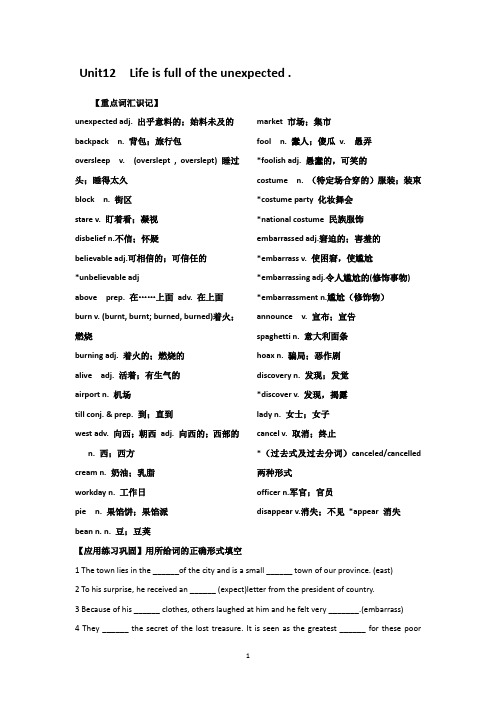
Unit12 Life is full of the unexpected .【重点词汇识记】unexpected adj. 出乎意料的;始料未及的backpack n. 背包;旅行包oversleep v. (overslept , overslept) 睡过头;睡得太久block n. 街区stare v. 盯着看;凝视disbelief n.不信;怀疑believable adj.可相信的;可信任的*unbelievable adjabove prep. 在……上面adv. 在上面burn v. (burnt, burnt; burned, burned)着火;燃烧burning adj. 着火的;燃烧的alive adj. 活着;有生气的airport n. 机场till conj. & prep. 到;直到west adv. 向西;朝西adj. 向西的;西部的n. 西;西方cream n. 奶油;乳脂workday n. 工作日pie n. 果馅饼;果馅派bean n. n. 豆;豆荚market 市场;集市fool n. 蠢人;傻瓜v. 愚弄*foolish adj. 愚蠢的,可笑的costume n. (特定场合穿的)服装;装束*costume party 化妆舞会*national costume 民族服饰embarrassed adj.窘迫的;害羞的*embarrass v. 使困窘,使尴尬*embarrassing adj.令人尴尬的(修饰事物) *embarrassment n.尴尬(修饰物)announce v. 宣布;宣告spaghetti n. 意大利面条hoax n. 骗局;恶作剧discovery n. 发现;发觉*discover v. 发现,揭露lady n. 女士;女子cancel v. 取消;终止*(过去式及过去分词)canceled/cancelled 两种形式officer n.军官;官员disappear v.消失;不见*appear 消失【应用练习巩固】用所给词的正确形式填空1 The town lies in the ______of the city and is a small ______ town of our province. (east)2 To his surprise, he received an ______ (expect)letter from the president of country.3 Because of his ______ clothes, others laughed at him and he felt very _______.(embarrass)4 They ______ the secret of the lost treasure. It is seen as the greatest ______ for these poorpeople .(discover)5 Carson was so _______ (sleep) last night that he ______(oversleep) this morning and was late for school.6 “It’s really ________ that the 6-year-old boy could kill the wolf.” All the villagers talked about the thing with _______. (believe)7 On April ______ Day , some people are often ______and cause a lot of ______ jokes. (fool)8 The forest was ______ and now it is still ______ with heavy smoke in the air. (burn)9 After the bad behavior ________ in the school, school made efforts to make it ______as soon as possible. (appear)10 Because of the heavy snow , the match___________(cancel) last week.【重点短语识记】1.be full of …充满;装满*be filled with ...充满,挤满2.by the time 在……以前*by the end of 截止到...为止3.get up 起床stay up熬夜4.in the shower在浴室take a shower 洗淋浴5.go off (闹钟)发出响声6.wake up(某人)醒来;唤醒(某人)7.rush out 冲出*rush around 匆忙8.give sb.a lift 捎某人一程*give sb a ride 捎某人一程9.in line with (与……)成一排wait in line排队等候*cut in line 插队10.in disbelief 不相信地;怀疑地11.hear about/of 听说* hear from 收到....的来信12.take off (飞机等)起飞;脱下(衣服)*take in 吸收,收养*take up 着手,开始13.think to oneself 暗自思索*say to oneself 自言自语14.turn into 变成*turn on/up/down/off*change into (形式)变成15 show up 赶到;露面*show sb. around*show sb in16 by the end of 在(某时间点)以前*at the end of17 get a chance to do sth.得到一个机会做... *have a chance to do sth有...做...的机会18.get/be dressed in+表示衣服/颜色的名词穿衣服;打扮起来* dress up 化妆,打扮19.all night 整晚*all day 整天21.play tricks on sb.欺骗某人;开某人玩笑*play jokes on sb.同某人开玩笑*play a trick/joke on sb.22.sell out卖光*on sale=at a big sale 大甩卖*sell well23.end up 结束;以...告终,最终成为*end up doing* end up with sthnd on着陆25.hundreds of许多;大量thousands of数以千计的;许许多多的26.leave my key in the backpack把钥匙忘在背包里*leave for/out27. bell ring 铃响了*ring过去式及过去分词28 put on 穿上(衣服)*put on weight 增减体重29 stare at 盯着,凝视30 get married to sb 与...结婚*(区别)be married to sb/marry sb./marry sb. to sb.31 run away from 从...逃脱【重点句型识记】1. By____________________the day, people had phoned to _________ how to get this water.到那天结束时,人们打电话去查寻怎样得到这种水。
- 1、下载文档前请自行甄别文档内容的完整性,平台不提供额外的编辑、内容补充、找答案等附加服务。
- 2、"仅部分预览"的文档,不可在线预览部分如存在完整性等问题,可反馈申请退款(可完整预览的文档不适用该条件!)。
- 3、如文档侵犯您的权益,请联系客服反馈,我们会尽快为您处理(人工客服工作时间:9:00-18:30)。
Unit 12 Life is full of the unexpected.
一、重点词汇
都指“在……上”,但有区别。
above表示高于某物,但不一定是正上方,反义词是below。
on表示在另一个的上面,有表面接触。
over表示高于某物,在正上方,反义词是under。
He lifted his hands above his head.
他将双手举过头顶。
They put some flowers on the teacher’s desk.
他们把花放在老师桌子上。
There is a bridge over the river.
河上有座桥。
词义辨析:alive/living/live/lively
都有“活着的”意思,含义和所做成分各有不同。
含义用法
alive人或物“活着的”,侧重生与死的界限。
是表语形容词,只做后置定语或补语,不能做前置定
语。
living人或物“活着的”。
主要用于做前置定语及定冠词the 之后表示一类人;
也可用作表语。
live物“活着的、有生命的”;也表示“实况
做前置定语。
转播的”。
lively人或物“活泼的,充满生气的”。
做定语、表语、补语。
He was alive when he was taken to the hospital.
他被送往医院时还活着。
The living must finish the work of those dead.
活着的人必须完成那些死去的人的事业。
He said he had seen a live whale.
他说他见过活鲸鱼。
He had a strange way of making his classes lively and interesting. 他有一种奇特的方法,使他的课生动有趣。
By the time I got to the station, the bus had already left.
我到车站的时候,汽车已经走了。
拓展:
by now:到现在为止(常与现在完成时连用)
Can you please give me a lift? I'm afraid my car broke down.
请让我搭一下车好吗?我的车坏了。
Make sure that the flowers on both sides are in line with the trees. 确保两边的花跟树成一排。
Don’t stare at me like that.
别那样盯着我看。
We waited until five o'clock, but he did not show up.
我们一直等到了5点,但是他始终没有露面。
By the end of last month, we had learned 10 units.
到上个月为止,我们已经学了10个单元。
拓展:
1. in the end:最终,最后
2. at the end of:在……的末尾/末端
unexpected adj. 出乎意料的
ring v.(钟,铃等)响
block n. 街区
disbelief n. 不信,怀疑
burn v. 燃烧
burning adj. 燃烧着的
airport n. 机场
till prep.&conj. 直到……
west adv. 向西 adj. 西方的
fool n. 傻瓜v. 愚弄
embarrassed adj. 窘迫的,尴尬的
embarrassing adj. 使人害羞的,使人尴尬的
costume party 化妆舞会
spaghetti n. 意大利面条
hoax n. 骗局,恶作剧
believable adj. 可相信的
disappear v. 消失
二、重点句型
解析:本句的主干是the first plane had already hit my office building;Before I could join the others outside 是由before 引导的时间状语从句;to see 是不定式表示目的;what was going on 是see 的宾语从句。
翻译:我还没得及走进人群看看到底出什么事了,第一架飞机就撞上了我们的办公楼。
解析:本句的主干是It happens on April 1st every year and is a day;when many people play all kinds of tricks and jokes on each other 是由when 引导的定语从句,修饰day。
翻译:愚人节是每年的4月1日,在这一天,许多人都会彼此捉弄,彼此开玩笑。
出题建议:确定好题型后,在关键词中输入when,就可以找到when 做引导词的定语从句了。
解析:本句的主干是a reporter in England announced…;One April Fool’s Day 表示时间;that there would be no more spaghetti 是announced 的宾语从句;because the spaghetti farmers in Italy had stopped growing spaghetti是由because 引导的原因状语从句。
翻译:有一年的愚人节,英国的一名记者宣称意大利面将会停产,因为意大利农民不再生产意大利面了。
解析:本句的主干是Welles made it sound real;so…that hundreds of people believed the…country是由so...that引导的状语从句,表示结果。
翻译:威尔斯的故事听起来非常真实,结果成百上千的人相信了这个故事,而且恐惧笼罩着整个国家。
三、重点语法
1. 概念:
过去完成时表示过去某一时间或动作以前已经发生或完成了的动作。
它表示动作发生的时间是“过去的过去”。
We had learnt 30 lessons by the end of last month.
到上个月末为止,我们已经学了30课。
2. 构成:had+过去分词
现在完成时表示的动作发生在过去,但侧重对现在产生的结果或造成的影响,或是由过去持续到现在的动作,与现在有关。
过去完成时则是一个相对的时态,它所表示的动作不仅发生在过去,更强调“过去的过去”,只有和过去某时或某动作相比较时,才用到它。
试比较:
I have cleaned the classroom .(强调扫地所产生的结果:地干净了!)
We have lived here for ten years.(“住”从过去持续到现在的动作用现在完成时)
Mr. Green had lived in New York for ten years before he came to China.
("来”中国已过去,而先前“住”在纽约更过去!)(另外注意:“住”在纽约可没有持续到现在哟!)
虽然这两种时态都表示过去发生的动作或存在的状态,但在使用时应注意以下几点:
1. 时间状语不同:过去完成时在时间上强调“过去的过去”;而一般过去时只强调过去某一特定的时间。
试比较:
They had arrived at the station by ten yesterday.
They arrived at the station at ten yesterday.
2. 在没有明确的过去时间状语作标志时,谓语动词动作发生的时间先后须依据上下文来判断:先发生的用过去完成时,后发生的则用一般过去时。
如:
She was very happy. Her whole family were pleased with her, too. She had just won the first in the composition competition.。
